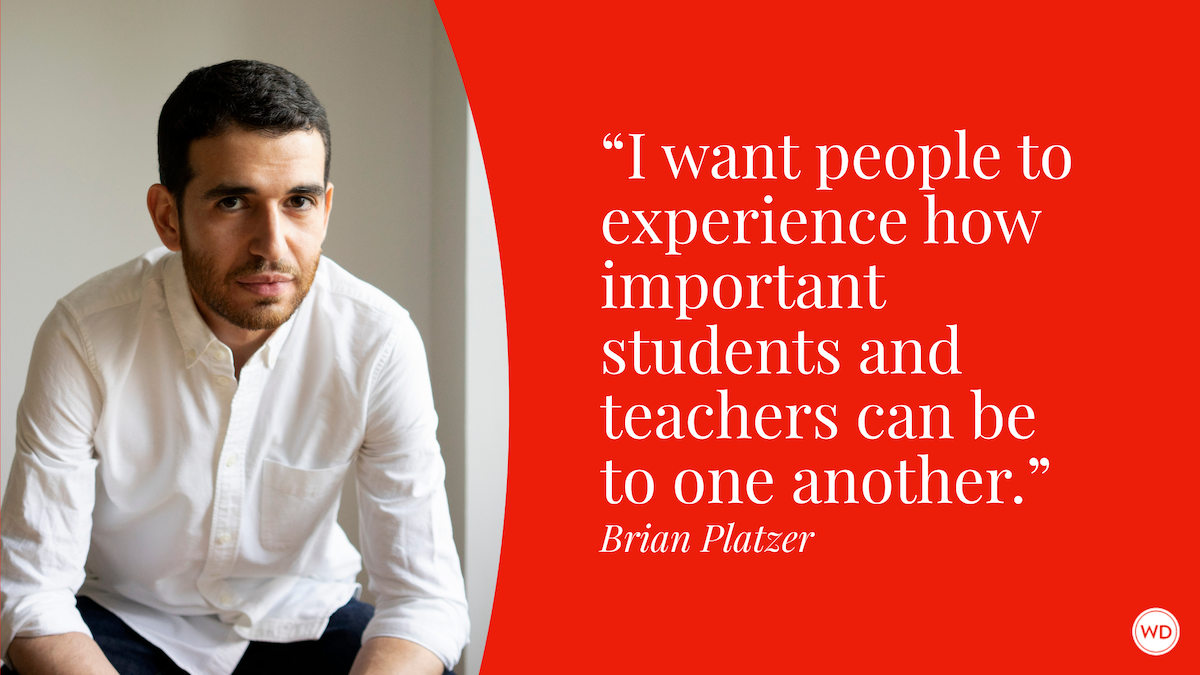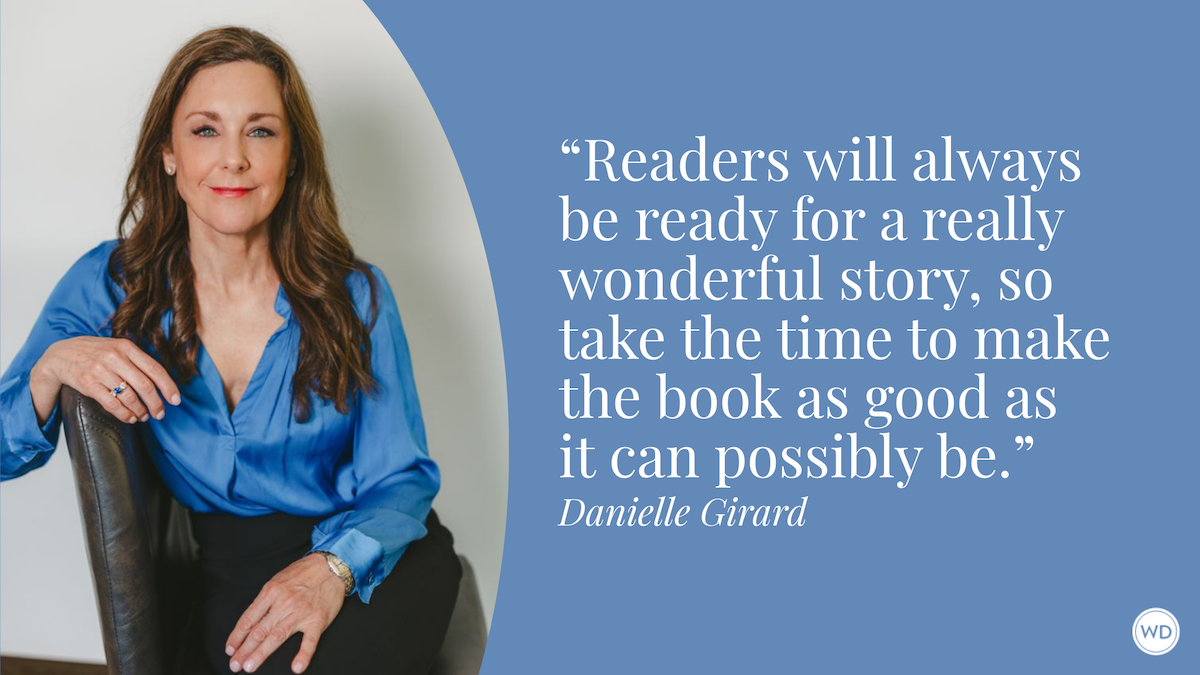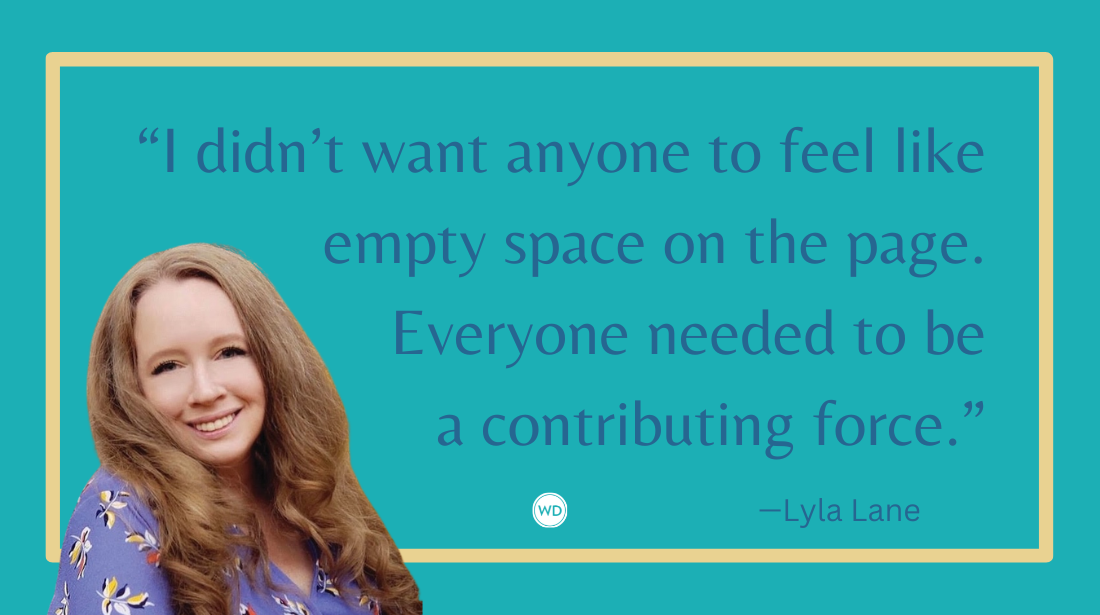Unstoppable: YA Fantasy Author Leigh Bardugo on World-Building and Having Faith in Your Abilities | The WD Interview
In this interview from the March/April 2018 issue of Writer’s Digest—including outtakes that didn’t appear in the magazine—bestselling author Leigh Bardugo discusses finding YA fantasy stardom and why, if pursuing a dream, you’re always on the right track.
In this full interview from the March/April 2018 issue of Writer’s Digest—including outtakes that didn't appear in the magazine—bestselling author Leigh Bardugo discusses finding YA fantasy stardom and why, if you're pursuing a dream, you're always on the right track.
Leigh Bardugo has always written the stories she wanted to write.
When querying her debut, Shadow and Bone—in which she introduced readers to a Czarist Russia-inspired world where individuals called Grisha have the mystical ability to manipulate matter—Bardugo was faced with a publishing-industry reality. Although young adult novels were popular at the time, and her premise was unique and compelling, no literary agents seemed interested in epic or high fantasy books for young readers.
She forged ahead anyway. “I knew very little about the market. I learned that many [agents] would not even entertain the idea of that kind of book,” she says. “It’s wise to know what’s out there, [but don’t] let that hinder you. If you have an idea, pursue it. [Think] about things that make your story a story that only you could tell—those are the things that will stand out.”
The strength of that story did eventually resonate with a rep, and the series was sold in a three-book deal in 2010. Within a week of its release in 2012, Shadow and Bone skyrocketed to the top of The New York Times bestseller list—as did her six books after that: 2013’s Siege and Storm and 2014’s Ruin and Rising, which rounded out the Grisha trilogy; 2015’s Six of Crows and 2016’s Crooked Kingdom, a “heist-con” duology Bardugo likens to “Ocean’s 11 meets Game of Thrones”; and her two latest stand-alones in 2017: The Language of Thorns, her first short story collection, and Wonder Woman: Warbringer, about the superhero’s teen years.
In sum, her books have sold more than 1 million copies combined internationally, and have earned such accolades as RT Reviewers Choice Awards in 2012 and 2015, and multiple starred reviews from Publishers Weekly, Kirkus Reviews, and School Library Journal. Bardugo regularly writes short stories for Tor.com, and she has appeared in various anthologies, including Last Night a Superhero Saved My Life with notable names like Jodi Picoult and Neil Gaiman, and Slasher Girls & Monster Boys alongside Jonathan Maberry and Kendare Blake.
Despite the impressive trajectory of her career, the path from aspiring author to bestseller was a circuitous one. Born in Jerusalem and raised in Southern California, Bardugo’s lifelong aspiration to be a writer led her to earn a degree in English from Yale. While struggling for years to finish a first draft of a novel (“I didn’t know yet that I was an outliner, and how badly I needed structure in order to work”), she took jobs in copywriting, advertising and as a Hollywood makeup and special effects artist. It wasn’t until she brushed off “some pretty wonky ideas” espoused by media, TV and film about what it meant to produce creative work that Bardugo was able to embrace a “terrible, messy, ugly first draft.” That experience taught her something valuable: “Let go of the idea that somehow you can outsmart a first draft,” she says. “Because I have never met anybody who can.”
The YA fantasy maestro took a break from promoting The Language of Thorns and Wonder Woman: Warbringer to talk world-building, personal perseverance, and more with WD.
The runaway success of a debut can put a lot of pressure on subsequent follow-ups. How did you manage to cope with that so gracefully?
When a book lists, there’s the illusion of runaway success. My [first book] listed, but it’s not as if you hit the New York Times bestseller list, and all of a sudden they give you the keys to a magical clubhouse and you’ve suddenly arrived. That’s one book, and a book does not make a career.
Certainly, I had a wonderful push from my publisher and got very lucky. I’m very aware of what it means to have a publisher back you. But your job as a writer, no matter what else is happening, is to continue to produce work—whether you’re succeeding or failing. [You have to put] aside ideas about sales or success or ambition, and just work. You know, I think I have a journey that looks smooth from the outside. And I’m always a little hesitant to talk about it because I don’t want people to get a false impression about what it takes to get published. But [up until the point of publishing Shadow and Bone], I did face plenty of rejection, and even after I signed with [my agent], every single one of those rejections stung. Because the marvel of the information age is that you’re still getting email rejections months and months after you sent them. [Laughs].
And so, until Shadow and Bone came out, I would read those rejections—because, of course, I had to read every single one of them—and I would think, Well, maybe they’re right and everybody else is wrong. Part of the journey is that horrific balance of, you know, delusions of grandeur and abject humility that I think writers walk the line of all the time.
You’ve talked about losing faith in your ability to become a professional writer. What would you tell others who are struggling with that same feeling?
I want to be really clear about something: I think we kind of fetishize the creative life. We have the vision of what it means to be an author, where you sit in your garret or looking out at your view and you give everything to your art and you commit fully to it. But the reality is that most of us have bills to pay. We have loans to pay off. We have educations to pay for. Some of us have children to take care of or other relatives or dependents or responsibilities.
And the idea that somehow you’re not a real writer if you are pursuing taking care of yourself and your life, as you pursue your art, is an incredibly damaging one. Very few people have the wherewithal or the safety net to be able to pursue writing full-time from moment one. And I want people to understand that you can absolutely work a job, sometimes two jobs, and have those responsibilities—and still write. I didn’t fail to become a writer, and therefore had to take a job. I had to take a job to keep a roof over my head because I had student loans to pay off. And that’s the way it works.
For writers trying to balance life and art, how would you encourage them to stay motivated in pursuing their passion?
Set realistic goals. Sometimes that means doing something like NaNoWriMo, or it means saying, “I’m just going to write 500 words a day, but I’m going to write 500 words a day.” Or “I’m going to do writing sprints for 30 minutes before work.” Or in the 45 minutes when my kid is napping, or whatever it is. Carve out a time, find a process that works for you and don’t compare yourself to anybody else.
[And] get offline. Stop reading about what other authors are doing. Stop reading reviews. Let yourself be immersed in the story that you’re writing.
Remember: There is no expiration date on your talent. I did not publish my first book until I was 35 years old. If you have a story to tell, it doesn’t matter when you tell it. Just get it onto the page and let go of any of the ideas that somehow it’s less worthwhile because it took you a little longer to get there than it took others.
Man, you’re inspiring me!
[Laughs.] Oh, good. Do it. Do it.
You’ve said before that there is no right way to write a book. You’ve been publishing at least one book per year since 2012, which is an impressive output. Describe your process.
I’m an outliner. I write through a three-act structure. I build all of my books in pretty much the exact same way: I have the idea, I write it out onto a single page so that I essentially have a book that is one-page long, and then I begin to fill in all of the things that I know. I build this kind of ramshackle zero-draft, that operates as an extended outline, and that is what becomes the musculature of the book. Now, when I get into the work of actually writing the scenes and revising the book into something that it can be, that process changes a little depending on the project.
Everybody processes differently, but [the exact method] is something you can keep coming back to when you feel psychologically embattled. A big part of writing is the discomfort of the work not being what you want it to be and the feelings of doubt or failure that come with not being able to make the idea instantly into what you want it to be.
Your books have very elaborate, well-rounded worlds. I haven’t read a book in a long time where I felt so there. When world-building, where do you typically begin?
I start with my characters and with the story, the plot. When a reader enters the first chapter of your book, they’re trying to get their bearings. It’s our job as authors to give them the signals they need in order to be able to navigate that world. The great challenge of world-building is not building the world. You could build a world with maps and languages and all these things [and still be missing something]. It’s releasing that information to the reader. The world-building that really falls into place first is what I always describe as the sense of power—helping readers understand how power flows in the book. That could mean governmental power, personal power, magical power, whatever. But [determining how power flows] is going to determine how your characters behave on the page, and what they’re able or not able to do.
You had help creating the Grisha Trilogy’s Ravkan language from David Peterson, who assisted with developing the Dothraki language in HBO’s "Game of Thrones." What was that like?
David and I met at Worldcon several years ago. I went to a presentation of his on Dothraki. He has been kind enough to be a resource for me as we’ve worked through the [Grisha] books, although we do occasionally butt heads because he wants me to be much more ambitious in my language in the book, and he’s very probably right.
You write a lot of diverse characters without falling victim to stereotypes. Do you think attitudes about diversity in publishing have shifted, or does the industry still have a ways to go?
I think both of those things are true. I think that there’s a new dedication to making sure that not only is representation better, but that marginalized authors and voices that maybe didn’t have voices before are increasingly given platforms in publishing. And that is not only as writers, but as editors and in everything from publicity to sales. That said, I don’t think there’s any question that there’s a long way to go because that is a long process and because until the fundamental power structures change, until the gatekeepers are different, I don’t think we’re going to see the kind of change that we really need to see—in the way not only that stories are told, but in the way they reach readers.
I’m sure many authors ask you what’s trending in YA. What do you think is the ideal balance of writing what you’re passionate about and understanding what’s drawing readers in the industry?
You have to know the market. So you have to know what’s selling, what isn’t selling anymore, what people are fatigued by. But that doesn’t mean you can say, “Oh, well, I [can ’t write that ever].” There was a period of time where people would say, “Oh, no more vampire books,” or “no more dystopians,” or no more this or that. But that is really false because what that actually meant was no more of that particular kind of story. We need a different take on vampires or we need to see a dystopian that is simply described as science fiction. YA shifts and moves faster than most other categories because so much work is being generated and consumed so quickly. And to be frank, I think if I brought Shadow and Bone out now, it would not have the same reception it had in 2012. Be aware of the market, but really, being aware of the market is just one part of being a storyteller and thinking about craft.
I heard you have a band, which is probably the coolest side hustle ever. What type of music do you play?
Our lead guitarist would probably punch me for this, but I’ve always described it as “geek rock.” It’s sort of like if you put the Pixies and the New Pornographers and a little bit of They Might Be Giants in a blender. I mostly sing. Unfortunately, all of our lives got taken over by adulthood: Our guitarist had a baby. Our bassist had a baby. Our drummer bought a house. I landed my dream job. But we do occasionally meet up for band brunch and one of these days we’ll have a reunion show.
I think that when you’re writing, being creative in other ways is really useful and therapeutic. And whether that’s creating visual art or making music—or hell, even baking—as long as you’re doing something that’s keeping you engaged and keeping you from chewing over reviews on Goodreads, I think you’re better off.
The Language of Thorns is a collection of short stories—your first such project. What led you to take a departure from novels?
Well, I had been wanting to write a collection of folktales for a while. I wrote the first of these short stories back in 2012, and I thought it might be exciting to write an illustrated collection of them. But at the time, it really was not something that was on the table. I was at the start of [the Shadow and Bone] trilogy and these kinds of books are also a little bit of a gamble. I wasn't in a position to take that gamble yet.
You’re no stranger to short prose, having written short works for several anthologies and for Tor.com for years. I think people often think short stories are “easier” than novels.
Yeah. I like writing short stories. I think, for me at least, it's incredibly challenging. But I also think I've gotten—I hope I've gotten—better as a writer. I hope my prose has gotten [stronger]. And I think a big part of that was the process of writing short stories for [outlets like] Tor.com. That was a big part of why I was able to progress in my work. It’s a different muscle that you're flexing, and it forces you to really think on the sentence level. It's a great exercise for writers to do, even if you don't intend to publish them.
Do you see any of those characters from The Language of Thorns or your other short stories making an appearance in a later novel?
I don't think so. These [in The Language of Thorns] are the folktales and fairytales that my characters would have grown up on. And so they exist in a time that is blurry in recollection. So, it should be hard to take apart what is real and what isn't, in the same way that there's usually some kernel of truth hidden in our folktales and fairytales.
I will say that I really enjoyed writing "When Water Sang Fire,” and there was a part of me that wanted to make it into a book. It's the longest story in the collection. But I don't know that that will ever happen. I don't think you can write something in a world—at least I know this is true for fantasy—without feeling like you're opening new doors to new places. And that's definitely something that happens even within a short story. And in those stories, I got to play with different kinds of magic and I got to occupy that kind of fun, all-knowing storyteller space, which I always enjoy and that I don't usually use in the bulk of my writing.
What’s next for you?
Well, King of Scars is the first book in my upcoming duology that continues the story of the Grishaverse, and will pick up the story of Nikolai Lantsov, the young king of Ravka. And I’m [also working on] Ninth House, my first novel for adults. It is the start of a series set at Yale, a dark fantasy that focuses on the secret societies among East Coast elites. I’ve got a couple of other things cooking, but nothing I can discuss just yet.








